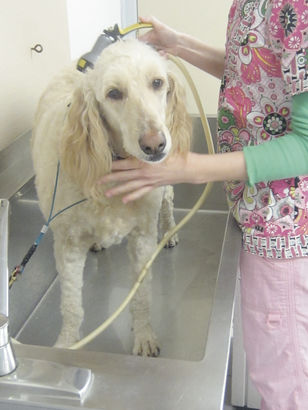Grooming Tips for Pets
By DR. REBEKAH FROST , Observer Today

Maizy gets a bath.
Grooming is an important part of the overall care and health of your pet. It is especially important this time of year when animals are shedding their winter coats. Because of the frigid temps this year, local dogs and cats have grown a much thicker coat and undercoat which they will be shedding over the next few weeks as the weather warms. Getting your young dog or cat used to good grooming habits will not only help them bond with you, but will help them learn to behave when it comes to being groomed at the groomers or veterinarians’ office.
Bathing.
You should bathe your pet monthly to every other month unless they are like my Border Collie Jake who very much enjoys a good roll in the horse manure or a dead animal! Bathing helps to condition the coat, removes unwanted odors, and removes dead skin cells and excessive oils. Bathing more than once monthly is important when a pet has an underlying skin condition such as allergic dermatitis or pyoderma (skin infections). Ask your veterinarian what is best for your pet and what shampoo should be used for different conditions.
Brushing
Brushing can be done on a daily basis especially for long haired animals that are shedding excessively this time of year. This prevents matting and also helps get rid of dead hairs and skin cells. There are many different brushes available – from undercoat combs to slicker brushes that just fluff the coat. Consult your pet store or groomer when purchasing a brush in order to buy the correct brush for your pet’s particular coat.
Shaving/Trimming
I rely on my groomer friend every eight weeks to help me with this. My Golden Doodle Maizy has a non-shedding coat that continuously grows like human hair. She turns into quite the hairbag if not shaved on a regular basis. Her hair coat is also very curly which tends to absorb mud and grabs any sticks, prickers, and burdocks outside. Because my family is active outdoors, it is very important to keep her trimmed regularly. There are many good groomers in our area that can help you. If you would prefer to groom your dog yourself, I recommend buying a good pair of clippers from a pet catalog or pet store. Make sure to buy different sized blades to keep your pet’s coat the desired length. If it is summer, do not shave your pet completely to the skin because this may lead to sunburn. Always leave some coat to protect the pet from the sun. It is important during the hotter months to trim thicker coated dogs. It is a misconception that these dogs are actually better protected with longer coats. These dogs can very easily overheat which is a life-threatening condition that calls for an immediate visit to the veterinarian
Pedicures
Toenail trims should be done at least monthly. This helps prevent unwanted curling or breaking of the toenails. It is very painful when your dog tears a toenail and exposes the sensitive nerve under the nail. If this happens, take your pet to the veterinarian because the torn toenail may die and need to be surgically removed. The pet may also need special bandaging, pain medications, and antibiotics.
Ear Cleaning
Ear cleaning should be done weekly with cotton balls or cotton swabs and a veterinarian prescribed ear cleanser. Do not use water because this can bring moisture into the ear canal leading to yeast or bacterial infections. If a dog’s ears are painful or have odorous debris or pus in them, the animal should be tested at your veterinarian’s office. Underlying infections can lead to ear drum rupture and can be very painful. Your pet may need anti-yeast or antibacterial medications prescribed by your veterinarian to treat common ear infections.
Other Grooming
Other parts of grooming your pet may include anal gland expression. This should only be done by a professional, preferably a veterinarian who has the proper medical training to express impacted or infected anal glands and diagnose problems associated with these glands. I have seen many anal gland expressions done improperly, which led to internal rupture, fistulous tracts, scarring, and even herniations in the muscles surrounding the glands. Your dog should normally express their anal glands when they defecate. If your dog is having a problem, they will be licking or scooting their hind end or may show discomfort when defecating. In any of these cases, have the dog checked by your veterinarian ASAP!
The Dunkirk Animal Clinic, staff offers baths, pedicures, and simple groomings. We also offer medical groomings for dogs and cats that may be difficult to handle and require sedation or elderly pets that have very frail skin. For the month of April we are offering a free pedicure with any of these groomings.
